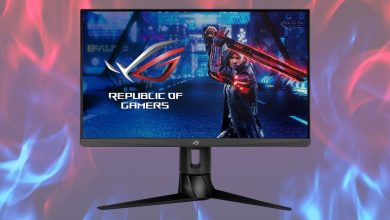What Is a Mini PC, and Should You Buy One?

If you’re in the market for a new computer, you might find that you’re a bit overwhelmed with all the options. But before you rush out and purchase another laptop, stop and consider whether a mini PC would be better suited to your needs. Whether you want it for a work-from-home environment or basic computing tasks, these miniature versions of PCs could be the answer for a lot of folks.
What Is a Mini PC?
Mini PCs are exactly that: scaled-down versions of desktop computers. They come in a variety of sizes and offer unique advantages, as well as some drawbacks.
Mini PCs are basically small box-shaped devices riddled with ports that, unlike laptops, don’t ship with any peripherals, such as a monitor, keyboard or trackpad. They can be a great fit for people who already have those items on hand.
One of the most significant differences between mini PCs and traditional desktops is their upgradability. Many mini PCs have limited upgrade options, due to their compact design. In some cases, components like RAM and storage are soldered directly to the motherboard, making them impossible to replace.
Due to their small size – comparable to a few smartphones stacked on top of each other – mini PCs can be quite limited in terms of power (that’s not always the case), but they allow users to perform most essential tasks, such as checking email. Examining which tasks you’ll do on a mini PC is key when making the decision of whether to go for a full-sized PC or a miniature version.
These compact desktop alternatives are not made by obscure companies, and many well-known computer manufacturers sell them. They also come with the warranties and support you would get from buying a laptop or full-sized desktop.
What Is a Mini PC Used For?
Mini PCs have evolved significantly over the years, and their capabilities now extend far beyond basic computing tasks.
For home users, mini PCs excel as media centers and entertainment hubs. Connected to a living room TV, they can stream 4K content from services like Netflix, YouTube, and other platforms with ease. Some models are powerful enough to handle casual gaming, allowing users to enjoy Steam games or emulate retro consoles in their living rooms.
Thanks to their ability to run office suites, video conferencing software, and most job-specific applications without breaking a sweat, mini PCs are increasingly popular for home offices and remote work setups. Their small footprint is particularly advantageous for those with limited desk space.
Businesses find numerous applications for mini PCs as well. They’re commonly used to power digital signage and kiosks in retail environments. In offices, they serve as thin clients for virtualized desktop environments or as compact workstations for basic office tasks. Once again, their energy efficiency and small size make them ideal for deployments, where space and power consumption are concerns.
Mini PCs also shine as home servers and network-attached storage (NAS) devices. Tech enthusiasts use them to set up personal cloud storage, run media servers like Plex, and even create their own VPN servers. Some users repurpose mini PCs as dedicated routers or turn them into network-wide ad blocks using software like Pi-hole or AdGuard or make them the brains for home automation.
I, personally, use a mini PC as an affordable computer for my young children. I’ve set it up with Endless OS, a Linux distribution that includes many educational tools and games. Because the mini PC doesn’t take up any significant space, I could easily place it in our living room, where we can surprise our children while they use it.
All in all, mini PCs are some of the most versatile computers around, but they’re not all created equally, which is why it’s important to choose the right one for your intended purpose.
Reasons to Buy a Mini PC
Mini PCs are essentially laptops without screens, and the reasons to buy them reflect this.
Arguably, the main reason to get a mini PC instead of a regular desktop PC is the amount of desk space you can save. You can find models with powerful processors, ample RAM, and even dedicated GPUs, all crammed into a package smaller than a hardcover book.
Another major reason to go with mini PCs is their energy efficiency. Since most mini PCs use what are essentially laptop components, they sip power rather than guzzle it. This translates to lower electricity bills and a reduced carbon footprint. The energy efficiency also contributes to quieter operation, as less heat generation means less need for noisy cooling systems. (Some get by with just heatsinks.)
Cost-effectiveness is another compelling reason to consider a mini PC. You’re essentially getting the guts of a laptop without paying for the parts you already have or prefer to choose separately.
As mentioned above, mini PCs offer impressive versatility. Their small size and low power consumption make them excellent candidates for a wide range of applications, many of which go beyond traditional computing.
How to Choose a Mini PC
Selecting the right mini PC can be a bit like solving a puzzle, but don’t worry – I’ll walk you through it step by step.
- Choose between an x86 (Intel or AMD) and ARM processor. Most mini PCs use x86 chips, which are compatible with standard Windows and Linux operating systems. If you’re eyeing an Apple Mac Mini, that’s ARM territory.
- I usually start with RAM when it comes to hardware specifications. When buying a mini PC as a laptop or desktop replacement, go with 16 GB. However, if you want to use the mini PC as a home server, entertainment hub, or smart home automation center, then 8 GB should be sufficient. You also need to decide how much storage you need and whether you want the option to upgrade later.
- Shifting your focus to your CPU and graphics card requirements, the CPU is the brain of your mini PC. For basic tasks, a slower one should suffice, but it’s definitely worth paying extra for a fast CPU if you expect to do any multitasking. Most mini PCs rely on integrated graphics, which are fine for everyday tasks and light gaming. The better GPUs support hardware transcoding technologies, like Intel Quick Sync Video, and those are particularly useful for media center PCs or home servers.
- Look for a good selection of ports to ensure your mini PC can connect to all your devices. Essential ports include USB (preferably including some USB 3.0 or higher for faster data transfer), HDMI or DisplayPort for display output, and Ethernet for a wired Internet connection. Some mini PCs also offer USB-C ports, which are great for their versatility. Don’t forget about wireless connectivity – make sure the mini PC has built-in Wi-Fi (preferably Wi-Fi 6 for future-proofing) and Bluetooth for connecting wireless peripherals.
- With consideration of your budget, mini PCs come in a wide range of prices, from budget-friendly options under $200 to high-end models that can cost over $1000. Set a budget based on your needs, and try to find the best value within that range. Remember to factor in the cost of any peripherals you may need, such as a monitor, keyboard, and mouse.
With these considerations in mind, you’ll be well-equipped to find a mini PC that’s just right for you, whether you’re setting up a compact workstation, a living room entertainment center, or something else entirely.
While mini PCs offer an excellent balance of power, size, and versatility for many users, it’s possible to go even more lightweight with single-board computers, the most famous of which is the Raspberry Pi. I personally don’t recommend using a Raspberry Pi as a mini PC replacement for general computing, but it’s a completely different story when it comes to DIY projects. If that’s what you’re interested in, I encourage you to explore – not just the Raspberry Pi, but also its most popular alternatives.
Image credit: Unsplash
Subscribe to our newsletter!
Our latest tutorials delivered straight to your inbox




